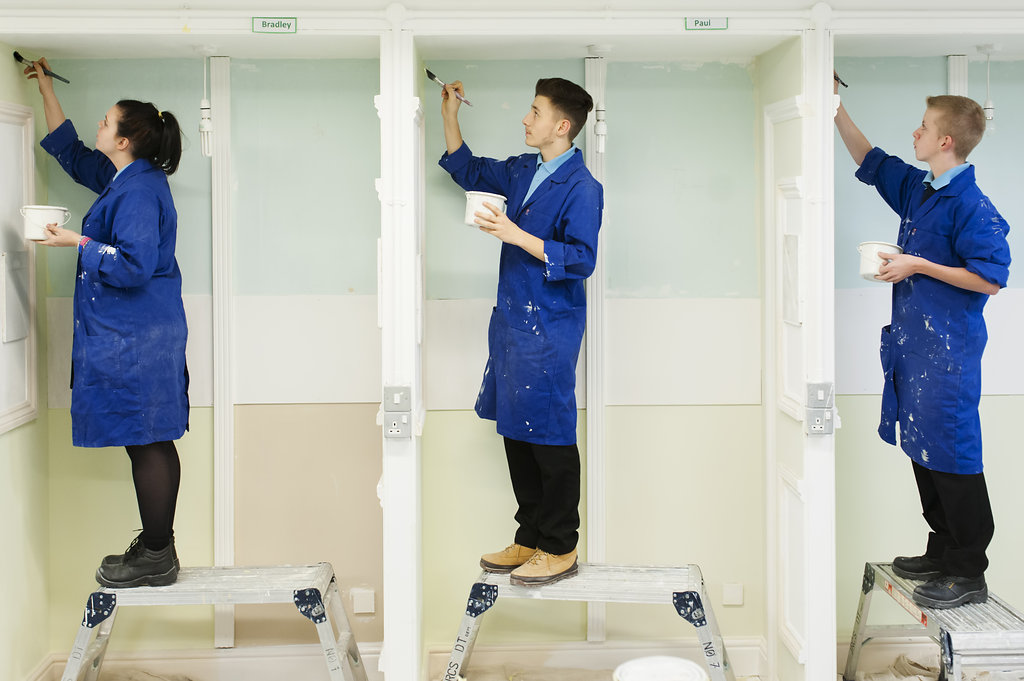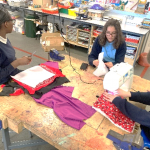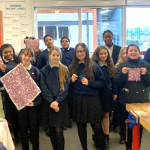We offer courses in the following:
- GCSE AQA Design and Technology
- BTEC First Award in Construction and the Built Environment – Last award 2023
- EDUCAS Level 1/ 2 Construction and the Built Environment – First award 2024
- CNAT Engineering design
- GCSE Eduqas Food Preparation and Nutrition
- WJEC: Level 1&2 Hospitality and catering
Level 1 / 2 BTEC First Award in Construction and the Built Environment
Exam Board: Edexcel
The BTEC First Award in Construction is a work-related qualification reflecting the knowledge, skills and understanding required in all aspects of the construction sector.
The course provides education and training in craft, technical and operative areas that are directly relevant to the changing needs of construction employees, employers and professions and an understanding of the key issues of sustainability and health, safety and welfare in the construction industry. Students will develop a range of skills and techniques, personal qualities and attitudes essential for successful performance in working life.
The course combines both theory and practical lessons and also will incorporate study through texts, discussion, and off-site visits and homework.
Key Stage 4 BTEC Homework tasks will be completed in the Spring and Summer term in Year 10 and Autumn and Spring term in Year 11. Students will complete tasks every fortnight to extend knowledge and understanding of key topics that will aid in achieving the best outcome in their externally assessed Unit test.
The course consists of 4 UNITS in total
3 CORE Units
Unit 1 – Construction Technology – Written externally assessed test. This will be a written 1hr test. Students that fail to pass this will not achieve the Full GCSE equivalent for this course.
Unit 2 – Scientific and Mathematical applications for Construction
Unit 3 – Construction and Design
1 Specialist Unit
Unit 7 – Introductory elements of Painting and Decorating.
LEVEL 1/2 CONSTRAUCTION AND THE BUILT ENVIRONMENT (TECHNICAL AWARD)
EXAM BOARD: EDUQAS
FULL COURSE
First award 2024 (YR10)
The Vocational Award in Construction and the Built Environment (Technical Award) has been designed to support learners in schools who want to learn about this vocational sector and the potential it can offer them for their careers or further study. It is most suitable as a foundation for further study. This further study would provide learners with the opportunity to develop a range of specialist and general skills that would support their progression to employment.
SKILLS STUDENTS WILL HAVE THE OPPORTUNITY TO DEVELOP INCLUDE
This course allows students to communicate and consult a client brief to develop a viable construction plan demostarting the appropriate trades and skills. Students will learn how the read and intruprt plans for a range of construction projects. By the end of the course students will gain clear insight in to the range of career paths within the construction industry.
CONTROLLED ASSESSMENT UNITS
Unit 1: Introduction to the Built Environment (Exam)
The unit introduces learners to the built environment and provides them with the opportunity to develop skills, knowledge and understanding in identifying, explaining and evaluating different ideas and concepts of the built environment. Learners will explore a range of profession and trade roles, and some of the different structures and buildings of the built environment.
Unit 2: Designing the Built Environment (Controlled assessment)
The unit offers learners the opportunity to develop skills, knowledge and understanding of the design of the built environment, including exploring what is needed to interpret and produce drafts, drawings, and models of design plans.
Unit 3: Constructing the Built Environment (Controlled assessment)
The unit offers learners the opportunity to develop skills, knowledge and understanding of three construction trade areas of the built environment, including planning, undertaking and evaluating construction tasks.
ASSESSMENT
- 60% Controlled assessment
- 40% Final exam
CAMBRIDGE NATIONAL: ENGINEERING DESIGN
EXAM BOARD: OCR
FULL COURSE
Last award 2023 (yr11 only)
Engineering design is a process used to identify market opportunities and solve problems which contribute to the development of new products and systems. This qualification is aimed at learners who wish to study the processes involved in designing new engineered products and the requirements of a design specification. Through research and practical activities, learners will understand how market requirements and opportunities inform client briefs and will use practical skills such as drawing, computer modelling and model making to communicate design ideas.
SKILLS STUDENTS WILL HAVE THE OPPORTUNITY TO DEVELOP INCLUDE
This course allows students to communicate and consult with a client to develop a viable and innovative product. Students will apply practical skills to produce a prototype in the form of a model and test design ideas to inform further product development. Through reflection, students will be able to evaluate the prototype, making a comparable outcome against specification points, and assess possible, practical solutions and improvements to their prototype design
Modules to be covered
R105: Design briefs, design specifications and user requirements
Learning Outcome 1: Understand the design cycle and the relationship between design briefs and design specifications
Learning Outcome 2: Understand the requirements of design specifications for the development of a new product
Learning Outcome 3: Know about the wider influences on the design of new products
CONTROLLED ASSESSMENT UNITS
R106: Product analysis and research
- Learning Outcome 1: Know how commercial production methods, quality and legislation impact on the design of products and components
- Learning Outcome 2: Be able to research existing products
- Learning Outcome 3: Be able to analyse an existing product through disassembly
R107: Developing and presenting engineering designs
- Learning Outcome 1: Be able to generate design proposals using a range of techniques
- Learning Outcome 2: Know how to develop designs using engineering drawing techniques and annotation
- Learning Outcome 3: Be able to use Computer Aided Design (CAD) software and techniques to produce and communicate design proposals
R108: 3D design realisation
- Learning Outcome 1: Know how to plan the making of a prototype
- Learning Outcome 2: Understand safe working practices used when making a prototype
- Learning Outcome 3: Be able to produce a prototype
Learning Outcome 4: Be able to evaluate the success of a prototype
ASSESSMENT
- 75% coursework
- 25% Final exam
CAMBRIDGE NATIONAL: ENGINEERING DESIGN
EXAM BOARD: OCR
FULL COURSE
First award 2024 (YR10)
Engineering design is a process used to identify market opportunities and solve problems which contribute to the development of new products and systems. This qualification is aimed at learners who wish to study the processes involved in designing new engineered products and the requirements of a design specification. Through research and practical activities, learners will understand how market requirements and opportunities inform client briefs and will use practical skills such as drawing, computer modelling and model making to communicate design ideas.
SKILLS STUDENTS WILL HAVE THE OPPORTUNITY TO DEVELOP INCLUDE
This course allows students to communicate and consult with a client to develop a viable and innovative product. Students will apply practical skills to produce a prototype in the form of a model and test design ideas to inform further product development. Through reflection, students will be able to evaluate the prototype, making a comparable outcome against specification points, and assess possible, practical solutions and improvements to their prototype design
Modules to be covered
R105: Design briefs, design specifications and user requirements
Learning Outcome 1: Understand the design cycle and the relationship between design briefs and design specifications
Learning Outcome 2: Understand the requirements of design specifications for the development of a new product
Learning Outcome 3: Know about the wider influences on the design of new products
CONTROLLED ASSESSMENT UNITS
R106: Product analysis and research
- Learning Outcome 1: Know how commercial production methods, quality and legislation impact on the design of products and components
- Learning Outcome 2: Be able to research existing products
- Learning Outcome 3: Be able to analyse an existing product through disassembly
R107: Developing and presenting engineering designs
- Learning Outcome 1: Be able to generate design proposals using a range of techniques
- Learning Outcome 2: Know how to develop designs using engineering drawing techniques and annotation
- Learning Outcome 3: Be able to use Computer Aided Design (CAD) software and techniques to produce and communicate design proposals
R108: 3D design realisation
- Learning Outcome 1: Know how to plan the making of a prototype
- Learning Outcome 2: Understand safe working practices used when making a prototype
- Learning Outcome 3: Be able to produce a prototype
Learning Outcome 4: Be able to evaluate the success of a prototype
ASSESSMENT
- 75% coursework
- 25% Final exam
GCSE DESIGN & TECHNOLOGY
EXAM BOARD: AQA
FULL COURSE
This course is largely workshop based. It is designed for students who enjoy using the workshop and completing practical work using the design process. It enables students to demonstrate their design and technology capability through problem solving, which requires them to combine skills with knowledge and understanding in order to design and make quality products. There is also design work that is carried out in folders completed in and out of lesson time.
Moduels to be covered:
In order to make effective design choices students will need a breadth of core technical knowledge and understanding that consists of:
- new and emerging technologies
- energy generation and storage
- developments in new materials
- systems approach to designing
- mechanical devices
- materials and their working properties.
SKILLS STUDENTS WILL HAVE THE OPPORTUNITY TO DEVELOP INCLUDE:
The ability to use graphic techniques and ICT, including CAD (Computer-Aided Design) and CAM (Computer-Aided Manufacture) to generate, develop, model and communicate design proposals; the ability to use tools and equipment safely, accurately and efficiently to achieve appropriate and reliable functioning three dimensional products that match their specifications; the ability to choose from a range of industrial applications when working with familiar materials and processes. The ability to analyse and work independently focus on the imagination, innovation and flair of designing and making.
CONTROLLED ASSESSMENT UNITS
AO1 – Identify, investigate & Outline design possibilities
- Identifying & Investigating design possibilities
- Producing a design brief and specification
A02 – Design & make a prototype that are fit for purpose
- Generating design ideas
- Developing design ideas
- Realising design ideas
A03 – Analyse & Evaluate
ASSESSMENT
- 50% coursework
- 50% Final exam
GCSE: FOOD PREPERATION & NUTRITION
EXAM BOARD: EDUQAS
FULL COURSE
This course equips learners with the knowledge, understanding and skills required to cook and apply the principles of food science, nutrition and healthy eating. It encourages learners to cook, enables them to make informed decisions about food and nutrition and allows them to acquire knowledge to be able to feed themselves and others affordably and nutritiously, now and later in life.
This course in food preparation and nutrition enables learners to make connections between theory and practice so that they are able to apply their understanding of food science and nutrition to practical cooking. This content relates to the study of both food and drinks. This is done through 6 areas of study:
- Food commodities
- Principles of nutrition
- Diet and good health
- The science of food
- Where food comes from
- Cooking and food preparation
SKILLS STUDENTS WILL HAVE THE OPPORTUNITY TO DEVELOP INCLUDE:
- be able to demonstrate effective and safe cooking skills by planning, preparing and cooking a variety of food commodities whilst using different cooking techniques and equipment
- develop knowledge and understanding of the functional properties and chemical characteristics of food as well as a sound knowledge of the nutritional content of food and drinks
- understand the relationship between diet, nutrition and health, including the physiological and psychological effects of poor diet and health
- understand the economic, environmental, ethical and socio-cultural influences on food availability, production processes, diet and health choices
- demonstrate knowledge and understanding of functional and nutritional properties, sensory qualities and microbiological food safety considerations when preparing, processing, storing, cooking and serving food
- understand and explore a range of ingredients and processes from different culinary traditions (traditional British and international) to inspire new ideas or modify existing recipes
CONTROLLED ASSESSMENT UNITS
|
Component 1: Principles of Food Preparation and Nutrition
Written examination: 1 hour 45 minutes 50% of qualification |
|
This component will consist of two sections both containing compulsory questions and will assess the six areas of content as listed in the specified GCSE content.
Section A: questions based on stimulus material.
Section B: structured, short and extended response questions to assess content related to food preparation and nutrition. |
|
Component 2: Food Preparation and Nutrition in Action
Non-examination assessment: internally assessed, externally moderated
Assessment 1: 8 hours
Assessment 2: 12 hours 50% of qualification |
|
Assessment 1: The Food Investigation Assessment A scientific food investigation which will assess the learner’s knowledge, skills and understanding in relation to scientific principles underlying the preparation and cooking of food. :
Assessment 2: The Food Preparation Assessment Prepare, cook and present a menu which assesses the learner’s knowledge, skills and understanding in relation to the planning, preparation, cooking and presentation of food. These assessments will be based on a choice of tasks released by WJEC annually. |
ASSESSMENT
- 50% coursework
- 50% Final exam
HOSPITALITY & CATERING LEVEL 1&2
EXAM BOARD: WJEC
FULL COURSE
The WJEC Level 1/2 Vocational Award in Hospitality and Catering has been designed to support learners in schools and colleges who want to learn about this vocational sector and the potential it can offer them for their careers or further study. It is most suitable as a foundation for further study. This further study would provide learners with the opportunity to develop a range of specialist and general skills that would support their progression to employment.
SKILLS STUDENTS WILL HAVE THE OPPORTUNITY TO DEVELOP INCLUDE:
- to safely prepare, cook and present nutritional dishes.
- to be able to draw on their learning of different types of provision and kitchen and front of house operations
- personal safety in their preparations.
responsibility for food safety in the industry
Units to be covered
Unit 1 The Hospitality and Catering Industry
LO1: Understand the environment in which hospitality and catering providers operate
LO2: Understand how hospitality and catering provisions operate
LO3 Understand how hospitality and catering provision meets health and safety requirements
LO4 Know how food can cause ill health
LO5 Be able to propose a hospitality and catering provision to meet specific requirements
Unit 2 Hospitality and Catering in Action
LO1 understand the importance of nutrition when planning menus
LO2 understand menu planning
LO3 be able to cook dishes
ASSESSMENT
- 50% coursework
- 50% Final exam







